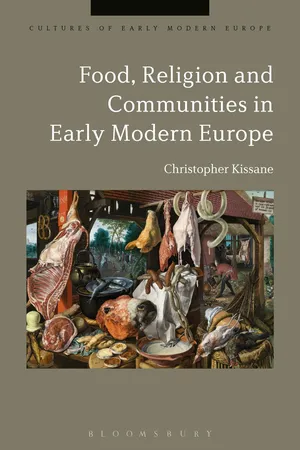
Food, Religion and Communities in Early Modern Europe
- 240 pages
- English
- PDF
- Available on iOS & Android
Food, Religion and Communities in Early Modern Europe
About this book
Using a three-part structure focused on the major historical subjects of the Inquisition, the Reformation and witchcraft, Christopher Kissane examines the relationship between food and religion in early modern Europe. Food, Religion and Communities in Early Modern Europe employs three key case studies in Castile, Zurich and Shetland to explore what food can reveal about the wider social and cultural history of early modern communities undergoing religious upheaval. Issues of identity, gender, cultural symbolism and community relations are analysed in a number of different contexts. The book also surveys the place of food in history and argues the need for historians not only to think more about food, but also with food in order to gain novel insights into historical issues. This is an important study for food historians and anyone seeking to understand the significant issues and events in early modern Europe from a fresh perspective.
Frequently asked questions
- Essential is ideal for learners and professionals who enjoy exploring a wide range of subjects. Access the Essential Library with 800,000+ trusted titles and best-sellers across business, personal growth, and the humanities. Includes unlimited reading time and Standard Read Aloud voice.
- Complete: Perfect for advanced learners and researchers needing full, unrestricted access. Unlock 1.4M+ books across hundreds of subjects, including academic and specialized titles. The Complete Plan also includes advanced features like Premium Read Aloud and Research Assistant.
Please note we cannot support devices running on iOS 13 and Android 7 or earlier. Learn more about using the app.
Information




Table of contents
- Cover
- Half-title
- Title
- Copyright
- Contents
- List of Figures
- List of Tables
- Acknowledgements
- List of Abbreviations
- 1. Introduction: Food and History
- Part 1: Food and Inquisition
- Part 2: Food and Reformation
- Part 3: Food and Witchcraft
- Notes
- Bibliography
- Index